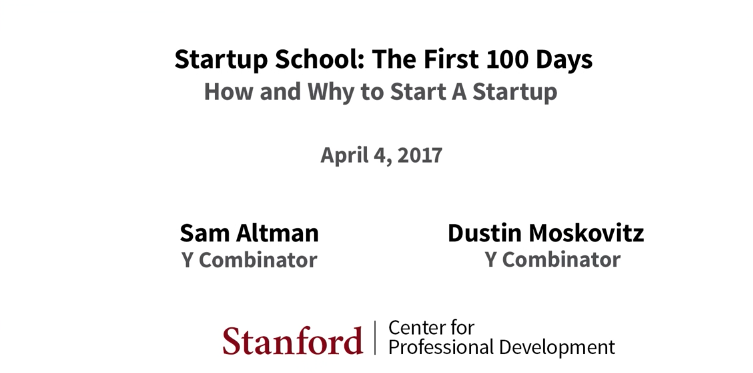
Video reference:
https://youtu.be/ZoqgAy3h4OM
Reasons to start a company
- Passion - you can't not do it (a pathological obsession)
- You are the best person to make this happen by starting the company.
- The problem was so important we could not stop working on it
Reasons not to start a company:
- Become very wealthy
- Massive impact
- Lifestyle
- Autonomy in how I spend my time
- Building a killer feature that might work well in an existing company
Actual state of affair doing startups
- Most markets already have competing players already
- Valuation multiples are lower now in the public market
- Existing entrenched players are now smarter and faster
- Tech Worker Talents are becoming more expensive
- Real estate in the bay area has gone up
- Founders more likely end up with nothing
- Founders have long term commitments - 10 years or more
- Employees get to leave after a few years
- Existing companies provide existing teams and infrastructure that help you succeed
- Impact gets magnified via infrastructure setup by company
- A lot of heads down time doing hard work
- High stress level
- Each round of fund raising is demanding
- Always feeling stretched thing
- Team is relying on you to deliver
- Team members is always being poached by recruiters
- Working on problems that could not be delegated
- Dealing with human issues
- You are always on call
- You are the leader and need to be a role model
- When joining late stage companies, you can ask existing employees and gain better clarity
- Founder breakups are really bad. To work with someone that you have worked with for a long time and need to discuss a lot of the details
Why the need for a Silicon Valley like community?
- High concentration of people doing the same nature of work
- They will take your wild ideas seriously even when they don't really understand it
- They will be willing to support your idea
- There is no tall poppy syndrome
- Culture of paying it forward
The Idea
- The idea is the most important thing
- Derivative ideas are not likely to succeed
- Pay attention to the problems you yourself are facing
- Students tend to be at the fore front of technology
- At the forefront, you can predict the Great Wave that is about to happen -
- new things become possible that were never possible before
- Startups you can do things that would otherwise could never have happened
- Watch out for what peers are doing and what they are excited about - even/especially if it looks like a toy
- Its easier to start a hard company - easier to attract talent
- Nurturing Idea:
Finding good ideas are not a solo endeavor.
- Find a group of smart people that you can start bouncing ideas off of
- Look for people that don't immediately shoot a bad half baked half form idea down
- See if people are willing to think how big if it worked
The importance of co-founder
- Look for the attributes in the following priority
Values first - make sure they believe in the same thing you believe in
- Aptitude second - make sure they have the ability to learn and then execute at the level that is need for the project to work
- Specific skill set last: a good bonus is if they already have the ability required to execute on what is required for the project
- Humble and not feel entitled
- Shared history and bond helps you keep going during times when it does not logically make sense to continue on the project
- Determination is the most valuable attribute when looking for co-founders
I always figure it out, I never give up
- Humble and not entitled
- They are doing it because they really want to build the stuff
The product
- Approach: A small number of people who loves you instead of a lot of people that like you
- Next find more people that will love the product
- A good indicator:
Retention and frequency of use
- How does it compare to another product in the space
- Nothing but a great product will save your company
- Talk to users that will help you build this great product
People generally don't want to disappoint you, they will fluff talk to you by saying they love your product, but you don't learn much
- Need to find out exactly what they are using your product for
- Watch them use your product to identify where they are doing things that doesn't make sense because they are using something else
- Ask them why they have not recommended this product to someone else
- Ask them why they are not willing to pay for this product
- Figure out times when they stop using your product and use some other products instead
- Top level questions don't help you
Getting the first 100 users
- Email people that you already know
- Call someone up
- If it is a paid product, you need to charge them
- Research on people that might use your product
- Conversion rate is 1-2%
- Send targeted email
- Social Media / Hackernews
- Need to figure out how to keep it on going
- The laziest way forward is to buy ads on Google and get people to come
Good operating principles
- Best founders:
they go visit their users,
- they go sit in the office of their users,
- AirBnB - they go live with their users
- Get to know their users really really well
- Short cycle time - talk to their users ask them what works or not, come up with another prototype and repeat the cycle
- The ideal goal is to build the fasting iterating company
- Make a long term commitment to a project, think of it as a 10 year project
cause you to think in a different way
- cause you to hire very different people
- *Lean and Mean* versus *Big and Powerful*
Stay lean and really really small until everything is working really well
- Flexibility of a company decreases with the Square of the number of employees
- Once things are working you will need to switch into hyper scale mode and get as big and as fast as you can with great people
- The signal to switch into *Big and Powerful* mode is when users are really begging to have your product and you are working 80 hours a week because people are all clamoring to get your product and you are not able to build it fast enough
- Hiring
Resist the urge to hire mediocre people
- The team you build is the company you build
- Best
- On Rejections
Take it as a learning experience of what didn't work
- Iterate to improve base on feedback
- Fiduciary duty to your stakeholders
maintain personal relationship
- take care of your own health
- Best CEO spends huge amount of time hiring and retaining their people
- Figure out the MISSION
Helps getting people to join them
- Helps media to write about them
- Become a great evangelist for this mission
- Clearly think and communicate this mission
Fund raising
- When people are desperate to give you money
- When you really need the money
- You need to display progress to warrant the funding you need
Appendix

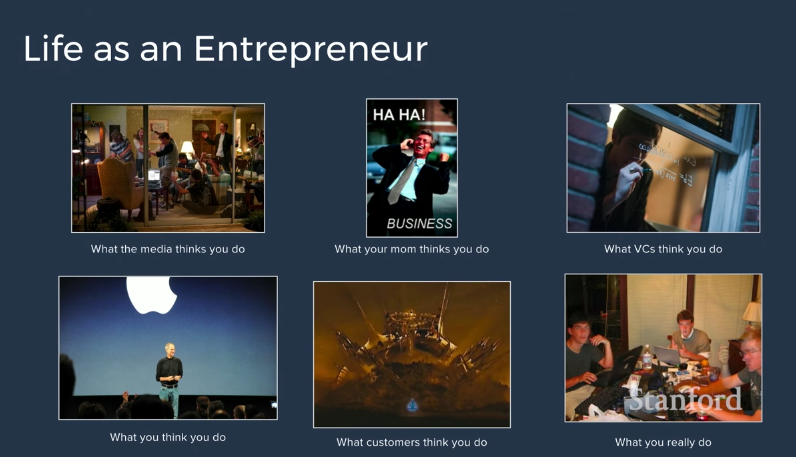
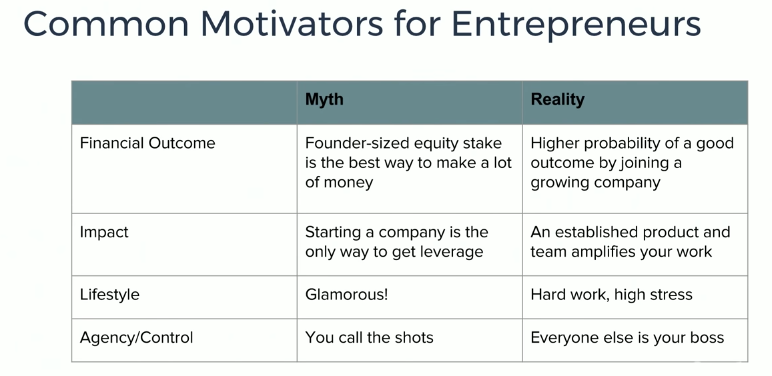
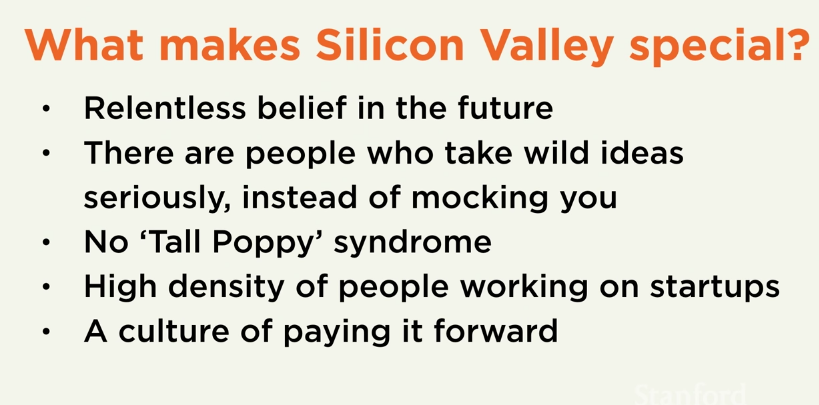
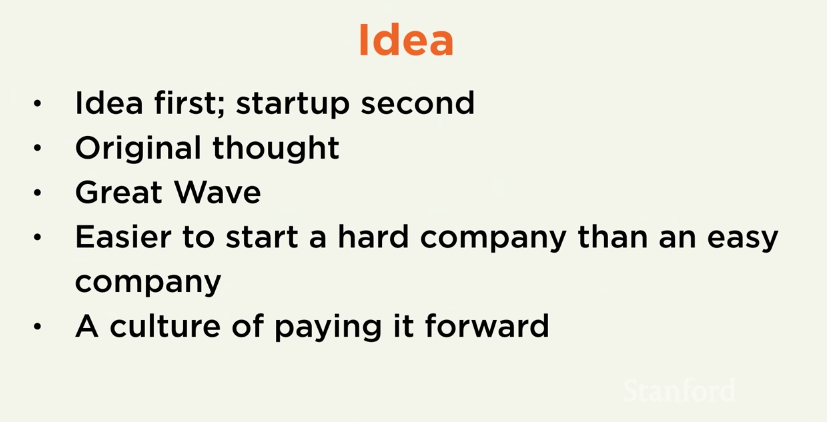
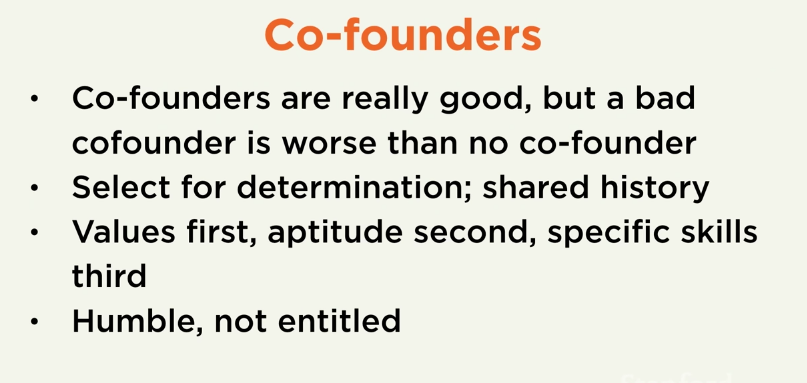
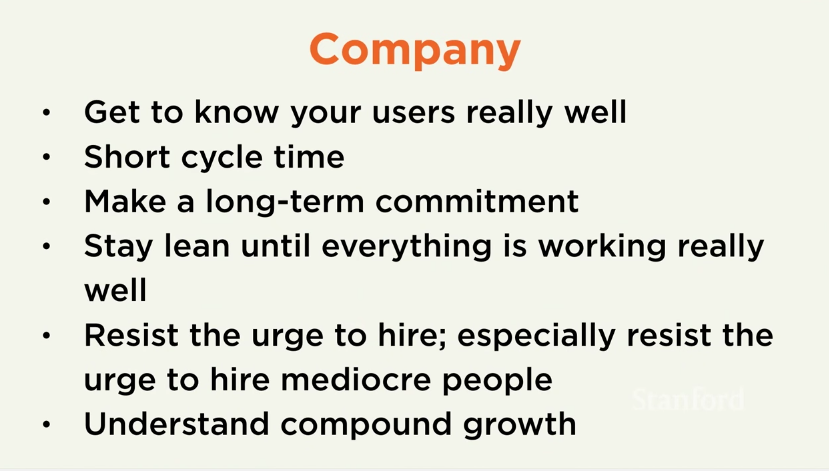
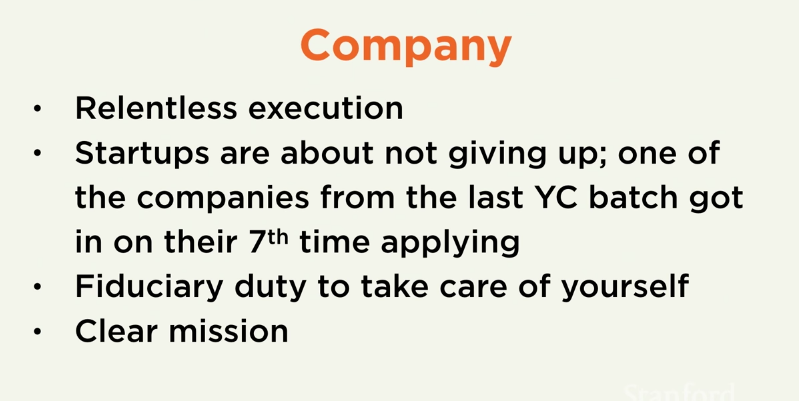
Further references
- Book: Hard things about hard things - Ben Horowitz
- Book: The score takes care of itself - Bill Walsh








